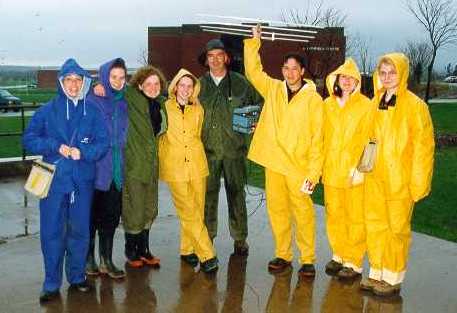Biology
307
FIELD
SCHOOL!
2018
|
Welcome to the St. Francis
Xavier University Biology Department's home
page for FIELD SCHOOL, Biology 307. Field School is a very popular intersession course offered May 6th - 19th, 2018. A normal course spans 13 weeks; this course is 13 days. This means you will be doing a week's worth of work every day. No bones (ok, there may be some bones in the course...) about it, this is an intense course. There are very few classes. You will have at least three field trips each week in which you will collect, measure and count organisms using a variety of methods. Assignments will be based on these outings and will form some of the method by which you'll be graded. This is an intense course. Students who use the Tramble Rooms to write their exams may want to discuss with the course instructors whether they would be suitable candidates for the course. We cannot offer examination in the Tramble Rooms for this course. We can provide extra time, and perhaps provide other accommodations for students in need. Additionally, you will be required to write a formal report on some aspect of field school. The report's due date will be announced at the first meeting, but is normally set about two weeks after the last day of field school. |
|
You can register for the course on-line. CRN = 10021; note that you must have the proper prerequisites completed to register for the course. If you don't, an over-ride may be possible, depending on the circumstances.
This is a field course. An athletic physique is not required, but sadly, we cannot accommodate people with mobility restrictions. We do a lot of walking on trails, through streams and other non-paved areas.
View our promo presentation!
At the initial meeting on Sunday evening (May 6th) 7:00 p.m. (roughly one and a half hour, Room 236
JBB Hall), you will be introduced to the instructors (see below) and you will be
informed of the schedule for at least the upcoming week. There will be lectures
on field safety and field books. Please come prepared for an evening outing,
i.e. wear appropriate clothing and have your field
book with you .
Field books are available in
the bookstore, which is not open on the weekends, and we will be gone earlier
than the bookstore's opening time on Monday morning. See below for more
details.
|
Prerequisites:
Biology 203; Biologies 201 and 202 will help. ISAR students can also take
this course. If you do not have the prerequisites or recommended courses,
talk to Mr. R. Lauff; overrides
come relatively easily. Required: A field notebook, available in the bookstore or a more general notebook available from other retailers in town. Have this prior to the first evening. The cost varies from a few dollars to $20, depending on what makes you happy. The more expensive ones can be waterproof, and have numeric tables or graph pages in them. Think simply. However, a clipboard is not acceptable. Your field book should be able to fit into a large pocket. |
Location:
Based in Antigonish, with local field trips every day. Unless otherwise
notified, meet in room 228, 8:00 each day.
|
Personnel and Topics - tentative!
|
Mark Pulsifer. My segment of
field school will focus on applied ecological and technical techniques.
Students will learn use of map and compass skills, GPS, and radio
telemetry applications. Organisms of interest include Freshwater Mussels
and Wood Turtles. | |
|
Randy Lauff. Entomology! The amazing
diversity of bugs will be open to you to explore. We will investigate
multiple methods for catching insects, as well as identifying them and
analyzing the data. Almost every year, Field Biology students find
insects of
significance. Some have even been deposited at
the Canadian National Collection,
Ottawa. |
Details:
Your days are scheduled to begin at 8:00, but field trips may go out earlier if
a lot of travel is involved. Evening field trips are likely. Don't expect to
leave lab prior to 10:00 p.m.
Clothing:
|
Rubber boots
Typical black rubber boots that go up your calf would be fine (duck boots
are not fine). Wear two pairs of socks with these. Black rubber
boots are available at a variety of outlets for less than $20/pr. These
are a very good investment. You can opt for boots with felt liners --
these cost a bit more, but are more comfortable and are warmer. Their
downside -- if you flood them, they'll be wet for a long time. |
|
Walking shoes/Hiking
boots
We recommend against runners/deck shoes etc for your outings. Ankle support can
be very important. In previous years, several people opted for work boots, which
was also a good choice. Sandals are not allowed, either in the field or
in the lab.
Rain suit Including pants and a jacket are essential. Even if it doesn't rain while we're out, wet vegetation can drench your pants. The rain pants also act as great splash guards while we're on the coast. Rain suits come in different qualities, typically thicker is better for keeping you dry and warm (as a wind barrier), but thicker suits don't scrunch up as well in your day pack. Avoid the cheapest ones...many are designed so poorly as to be deemed "single use only".

Happy, DRY students (and therefore a happy instructor, too).
Hat The sun can be your friend or your enemy. A ball cap is minimum, but doesn't offer the all round protection that sun hats do. Cheap sun hats can be had for a few dollars; more durable ones will cost more.
Pants
Jeans are rugged and wind resistant, but are a drag when wet and don't offer the
flexibility that many hikers enjoy when wearing less binding pants. I like
gardening pants (see photo) but work pants are useful, too.
Tights are relatively useless in the field, except as
an undergarment. They have no pockets and no belt. And, they are black
(usually). Black is the number one colour which attracts biting
flies.
Shirts Button shirts are more flexible than t-shirts. Most of my field shirts are from used clothing stores (a few bucks each) or from my father (I still get hand-me-downs). Shirts can have the sleeves rolled up or down, the buttons done up or not, and have a sometimes-critical pocket, all things t-shirts can't offer. I find them more comfortable overall.
Other Stuff A day pack, snacks,
water bottle (an old one litre pop bottle is what a lot of us use, or two
500 ml bottles, minimum), pencil, folding knife. A sleeping bag
and foamy...we usually have an easy, one night camp out. A small Satchel (smaller than the one shown in the link), one
that fits your field book and a variety of other small things, is very useful.
We have a few we can issue out, but if you've got one, bring it. Two are visible
with the outer two students in the photo above.
Optional Stuff:We have compasses, but you may wish to use your own. A calculator will be useful. Chocolate cheesecake as gifts for your teachers never hurts. Cameras can be useful, binoculars are also handy. We no longer have a computer lab in the building; bringing your own laptop may be useful. We lock the lab when we're gone.
Safety Gear Although we will always have first aid kits with us, you may want to bring a small kit as well. At the very least, a few bandages and alcohol wipes should be tucked in your daypack somewhere. Sunscreen could be useful, even in early May. In 1999, we had temperatures in the high 20's which made for some discomfort among participants. You may want to bring some insect repellent, biting flies aren't usually too bad though (we have had years when black flies popped out early).
|
R.F. Lauff
|



